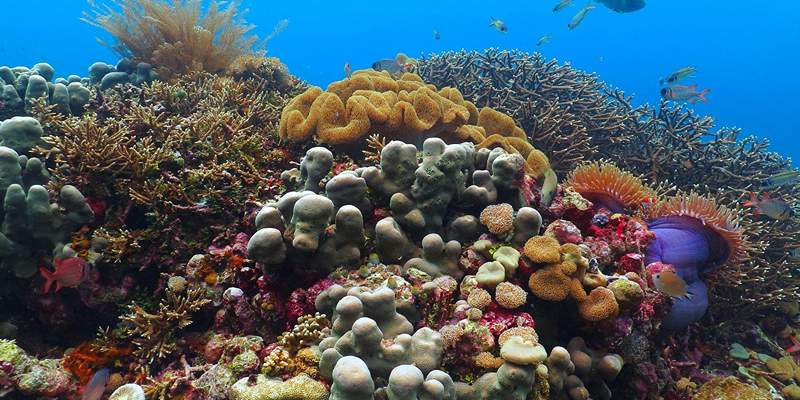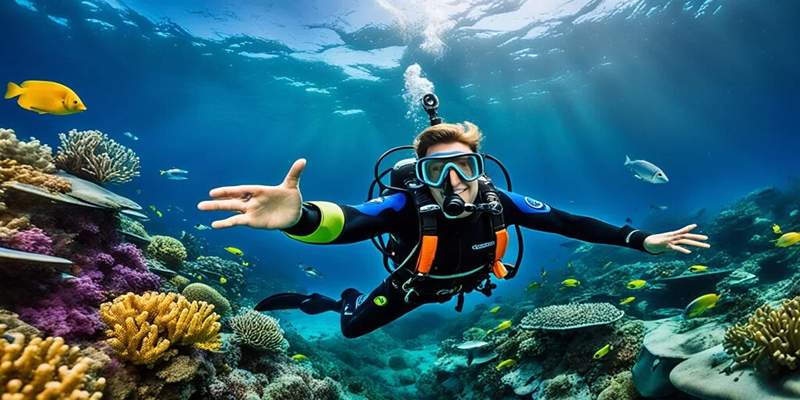Introduction
With its blue waves and colourful coral reefs, Tobago is a dream destination for people who love the ocean. Snorkelers dive, and eco-tourists come from around the world to visit the island because the underwater views are so beautiful. People who enjoy this natural beauty must also take care of it so future generations can enjoy it. This guide will help you visit Tobago's reefs in a way that is good for the environment.
Best Snorkeling and Diving Spots in Tobago
If you're planning to explore Tobago's marine life, some spots are particularly known for their stunning biodiversity.
- Buccoo Reef: One of Tobago's most famous coral reefs, Buccoo offers shallow waters, making it perfect for snorkelling. Its vibrant fish and coral species are a sight to behold.
- Speyside: A haven for divers, Speyside is known for its deeper waters and sightings of manta rays and sharks. Little Tobago Island nearby adds an extra layer of adventure.
- Nylon Pool: A shallow, crystal-clear area surrounded by coral reefs, ideal for beginners or families looking for a relaxed snorkeling experience.
- The Sisters Rocks: A cluster of rocky islets that attract experienced divers with their dramatic underwater scenery and diverse marine life.
These spots offer unparalleled views of marine ecosystems and highlight the importance of reef conservation.
What to Pack for Your Reef Adventure?
Having the right gear ensures a safe and enjoyable experience. Here are a few essentials to pack:
- Snorkeling or diving gear: While you can rent equipment on the island, having your own ensure better hygiene and comfort.
- Reef-safe sunscreen: Regular sunscreens contain harmful chemicals that can damage coral reefs. Opt for eco-friendly options.
- Waterproof camera: Responsibly capture the vibrant underwater world without disturbing marine life.
- Swimwear and rash guard: Protect your skin from the sun and potential scrapes from sharp coral or rocks.
- Reusable water bottle: Stay hydrated without contributing to plastic pollution.
Eco-Friendly Tips for Visiting Tobago's Reefs

Sustainable tourism plays a crucial role in preserving Tobago's coral reefs. Follow these tips to minimize your impact:
- Do not touch or step on corals: Corals are fragile and take years to grow. Any physical damage can be devastating to their ecosystem.
- Avoid feeding marine life: This disrupts their natural behavior and diet.
- Choose eco-certified tour operators: Many local operators follow sustainable practices that support conservation efforts.
- Dispose of waste properly: Return all your trash to designated bins on land to keep the marine environment clean.
- Support local conservation projects: Donate to organizations working to protect Tobago's reefs or participate in beach clean-up events.
When to Visit Tobago for the Best Reef Experience?
Tobago enjoys a tropical climate, making it a year-round destination. However, certain times of the year offer better conditions for underwater activities:
- Dry Season (December to May): The calm seas and clear skies during this period are ideal for snorkeling and diving. Visibility underwater is also at its best.
- Rainy Season (June to November): Although there's more rainfall, the waters are still warm, and fewer crowds make for a quieter experience.
Check with local operators for real-time updates on sea conditions, as these can vary based on weather patterns.
Understanding Conservation Efforts in Tobago
Tobago has been proactive in protecting its marine ecosystems. The Buccoo Reef Marine Park is a protected area where activities are regulated to minimize environmental impact. Local NGOs and communities also work tirelessly to raise awareness about reef conservation. By visiting responsibly, you contribute to these efforts, helping preserve Tobago's reefs for generations.
Local Experiences Beyond the Reefs
While Tobago's underwater world is mesmerizing, there's much to explore above water as well:
- Glass-bottom boat tours: Perfect for those who want to see marine life without getting wet.
- Kayaking and paddleboarding: Enjoy the serenity of the surrounding waters while getting a unique perspective of the island.
- Local cuisine and culture: Try authentic Tobagonian dishes like curried crab and dumplings, and interact with locals to learn about their rich traditions.
These activities allow you to connect with the island holistically while supporting local businesses.
How to Choose the Right Tour Operator for Reef Exploration?

Selecting the right tour operator is critical in ensuring that your reef exploration is enjoyable, safe, and eco-friendly. Tobago offers a wide range of operators, but choosing one that prioritizes sustainable tourism and conservation is essential. Here’s how you can make an informed choice:
- Look for eco-certifications: Reputable operators often hold certifications that indicate their commitment to sustainable practices. These certifications ensure that they follow guidelines to minimize environmental impact.
- Ask about group sizes: Smaller groups are less disruptive to marine life and provide a more personalized experience. Operators that limit the number of participants often prioritize quality over quantity.
- Inquire about their practices: A good operator will be transparent about their efforts to protect the reefs, such as using mooring buoys instead of anchors and educating participants about reef conservation.
- Read reviews: Look for feedback from previous travelers to understand the operator’s reputation. Positive reviews about safety, professionalism, and eco-friendly practices are good indicators.
By choosing an ethical tour operator, you can ensure that your adventure contributes to the preservation of Tobago’s reefs while supporting local businesses committed to sustainable tourism.
Final Thoughts
Tobago's reefs are a window into one of the planet's most vibrant ecosystems, offering thrilling and humbling experiences. By visiting responsibly, you ensure these natural wonders remain intact for future adventurers. Plan your trip with eco-consciousness in mind, and you'll not only create unforgettable memories but also make a positive impact on this beautiful island.
Embrace the beauty of Tobago's reefs, and let your journey be a celebration of nature and its preservation.












